Tencent Holds Youth Science Festival Jointly with SCIENCE and Tsinghua University
On January 12, the second Tencent Youth Science Festival was hosted jointly by Tencent, top-level science magazine Science and Tsinghua University. At the New Tsinghua Xuetang, eight of the world’s top scientists and popular science scholars noted the annual scientific breakthroughs in astronomy, mathematical physics, life sciences and chemistry for youth. The event was broadcast live on 19 platforms including news.qq.com and live.kuaishou.com. A parent-children session was also introduced for the first time, giving parents a chance to experience the enchantment of science together with their children.
The Tencent Youth Science Festival is a popular science event tailor-made for young people. On this occasion, Tencent and the world’s leading academic journal, Science, published the second annual Science Breakthroughs for Youth, which indicated astronomy as the most popular discipline among the youth. The world’s top scientists and popular science scholars, including the first chief scientist of China’s Lunar Exploration Program (CLEP) Ziyuan Ouyang, Science’s News Editor Tim Appenzeller, astrophysicist Avery Broderick, astronomer Jifeng Liu, Dean of School of Life Sciences of Tsinghua University Hongwei Wang, the originator of the Ig Nobel Prizes Marc Abrahams, Tencent’s distinguished scientist Shengyu Zhang, and inorganic chemistry expert David G. Evans, worked closely with the youth to decode the secrets behind the most cutting-edge scientific breakthroughs, including black hole, the lunar exploration program, cryoelectron microscopy and quantum physics.
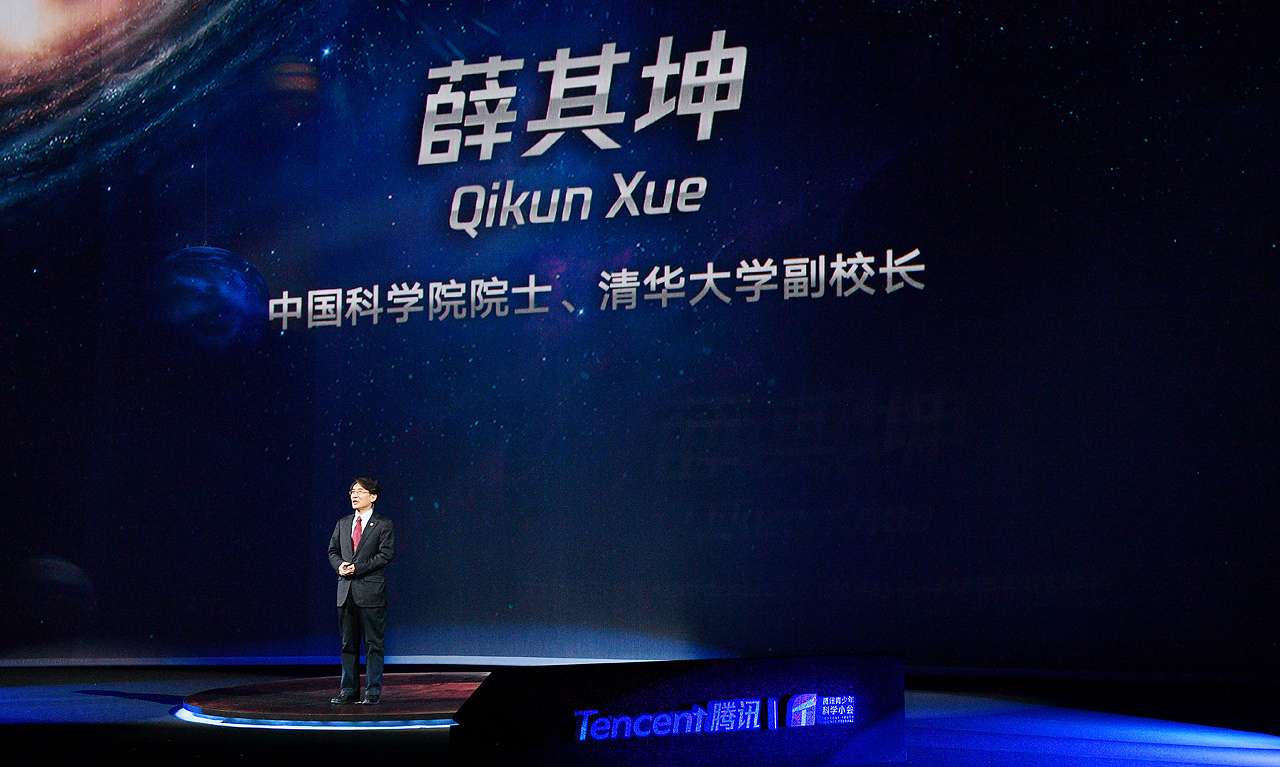
Qikun Xue, Member of the Chinese Academy of Sciences, Vice president of Tsinghua University
“I hope more children will get to know more scientists and understand more about scientific breakthroughs at the Tencent Youth Science Festival,” said Vice President of Tsinghua University Qikun Xue, who added that science is a key factor to national development and human destiny. In the future, the main force behind scientific research projects in China will be today’s children, making it imperative to enhance the young generation’s consciousness of science.
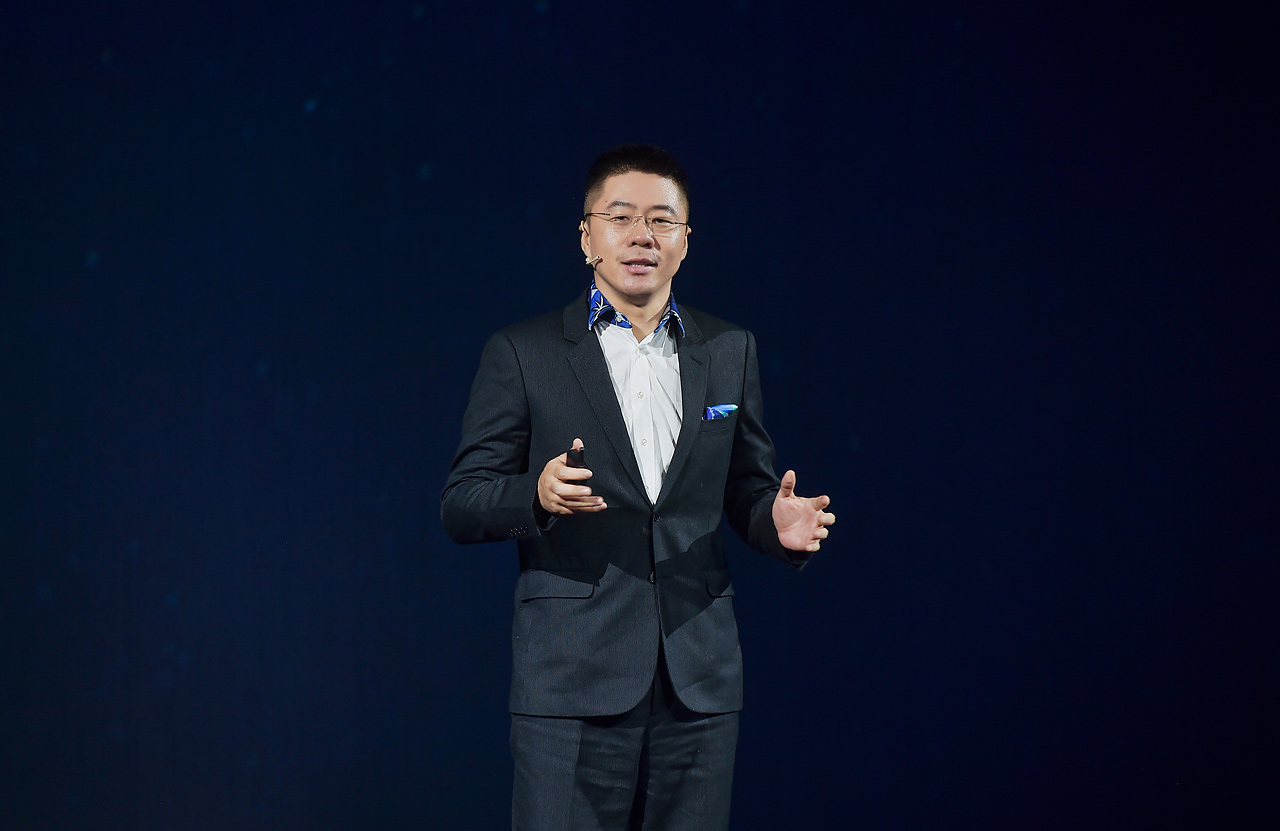
Edward Cheng, Vice President of Tencent and CEO of Tencent Pictures
“The Tencent Youth Science Festival combines the knowledge of scientists with the fun of science, helping to cultivate children’s curiosity and introduce science to their lives,” said Edward Wu, Vice President of Tencent and CEO of Tencent Pictures. “Science is the spirit of exploring the unknown. It starts from our inherent curiosity that begins during childhood. Not all children will become scientists, but the protection and enlightenment of their curiosity will help every child embrace a more beautiful life. This is our original aspiration behind this event.”
Black holes, cryoelectron microscopy and quantum computing: Science stories told by the scientists
Seven leading scientists and popular science scholars took the stage, sharing scientific breakthroughs and knowledge in a lively and interesting way, including black holes and microbes under Cryo-EM.
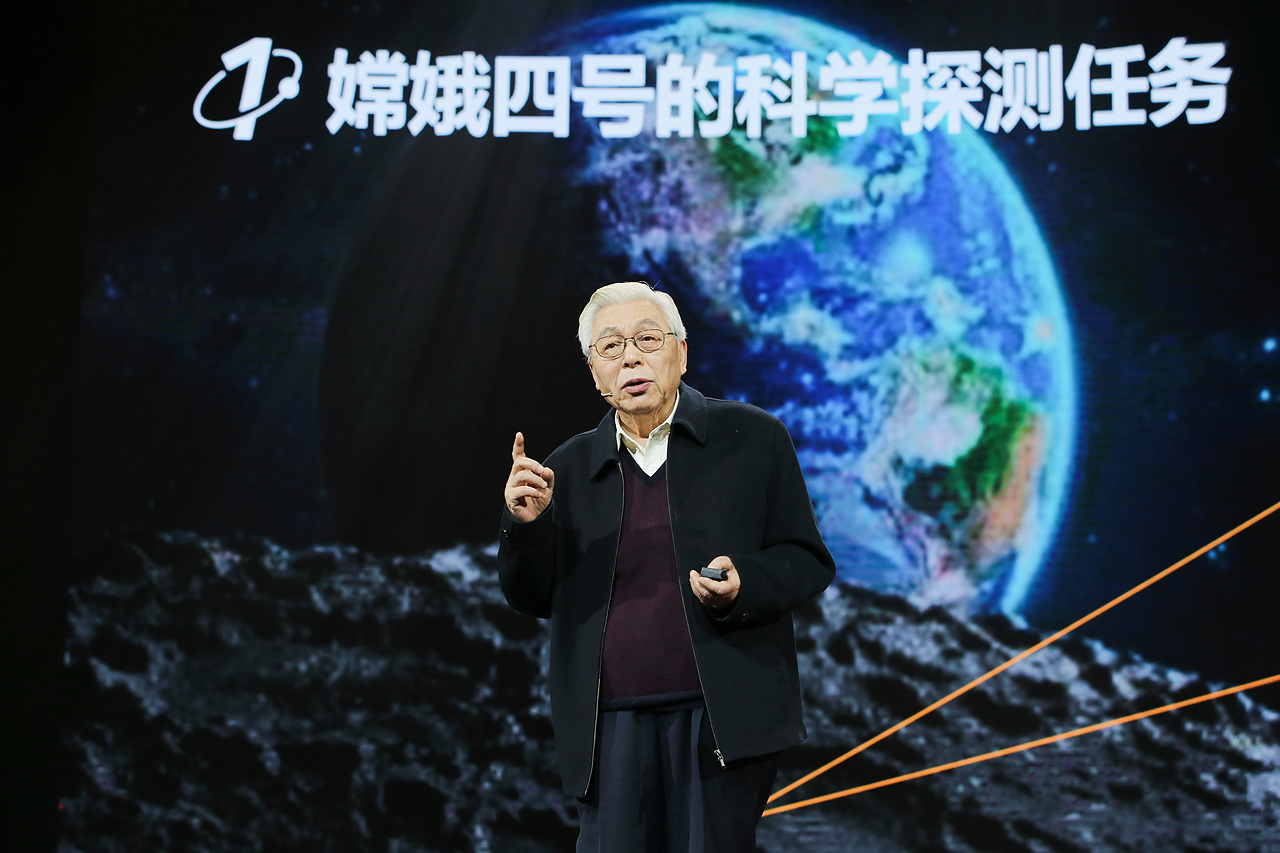
Ziyuan Ouyang, China's first chief scientist for lunar exploration project, "the father of Chang'e lunar exploration program”
CLEP’s first chief scientist Ziyuan Ouyang described the immense challenges involved in developing China’s lunar exploration program from its initial stages to China’s successful landing on the dark side of the moon. He explained to the children the scientific principles behind this achievement, leading them to imagine the future of human exploration of an even vaster space. “China was the first to discover the signs of life on Mars. I believe that we can develop Mars from a desolate planet into a second habitat for mankind, bringing a more beautiful and happier future for all of us.”
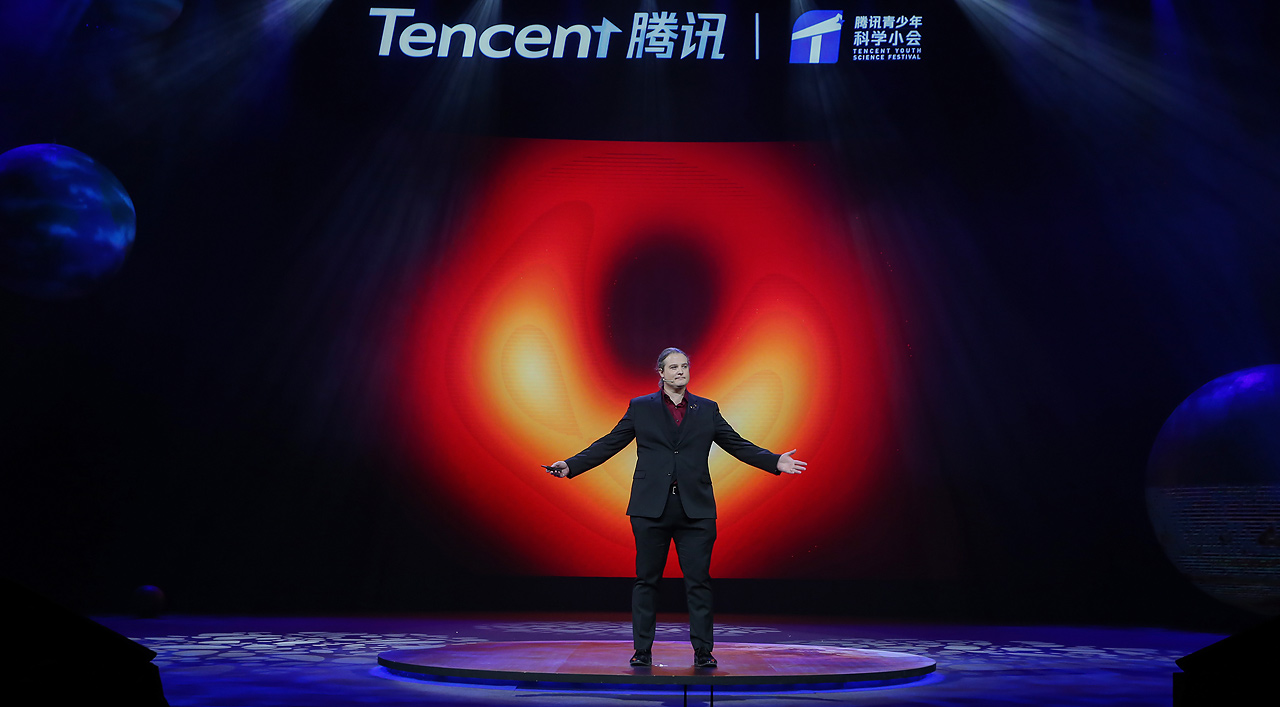
Avery Broderick, one of the scientists behind the world's first black hole photo, Professor of University of Waterloo, Canada
As one of the chief leaders of the Event Horizon Telescope (EHT), Avery Broderick helped his team capture the world’s first black hole image. “This is the best time to study black holes. Young people, the main force in this field, will witness that great moment when scientific stories become part of our real world,” he said. He revealed the mystery behind the photo with the audience. “EHT has a lot of telescopes around the world. On that day, all the observatories and telescopes turned in the same direction, that is, the M87 black hole within the constellation Virgo. It’s the first time ever in human history that a picture of the core of a black hole was successfully taken.”
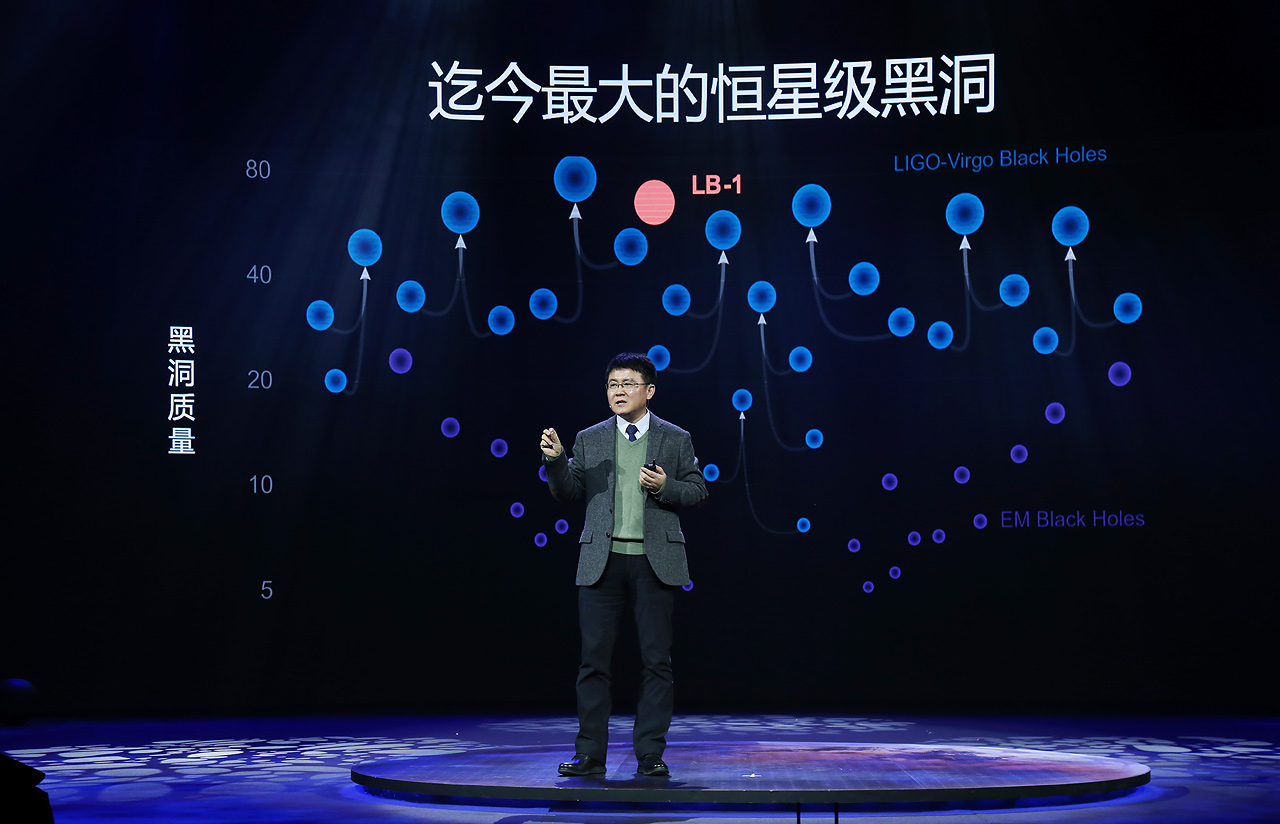
Jifeng Liu, the hunter who captures the "King of black holes", deputy director of the National Observatory of the Chinese Academy of Sciences
In 2019, another significant scientific breakthrough in human exploration into black holes was the hunting down of the “king of all black holes”, the stellar black hole LB-1 with the largest mass ever, conducted by Associate Director of the National Astronomical Observatories of the Chinese Academy of Sciences Jifeng Liu and his team. “One day, we will be able to see the entire universe and its every corner,” he said, “How we attempt to understand the universe is a test for us. It’s also a gift for us.”
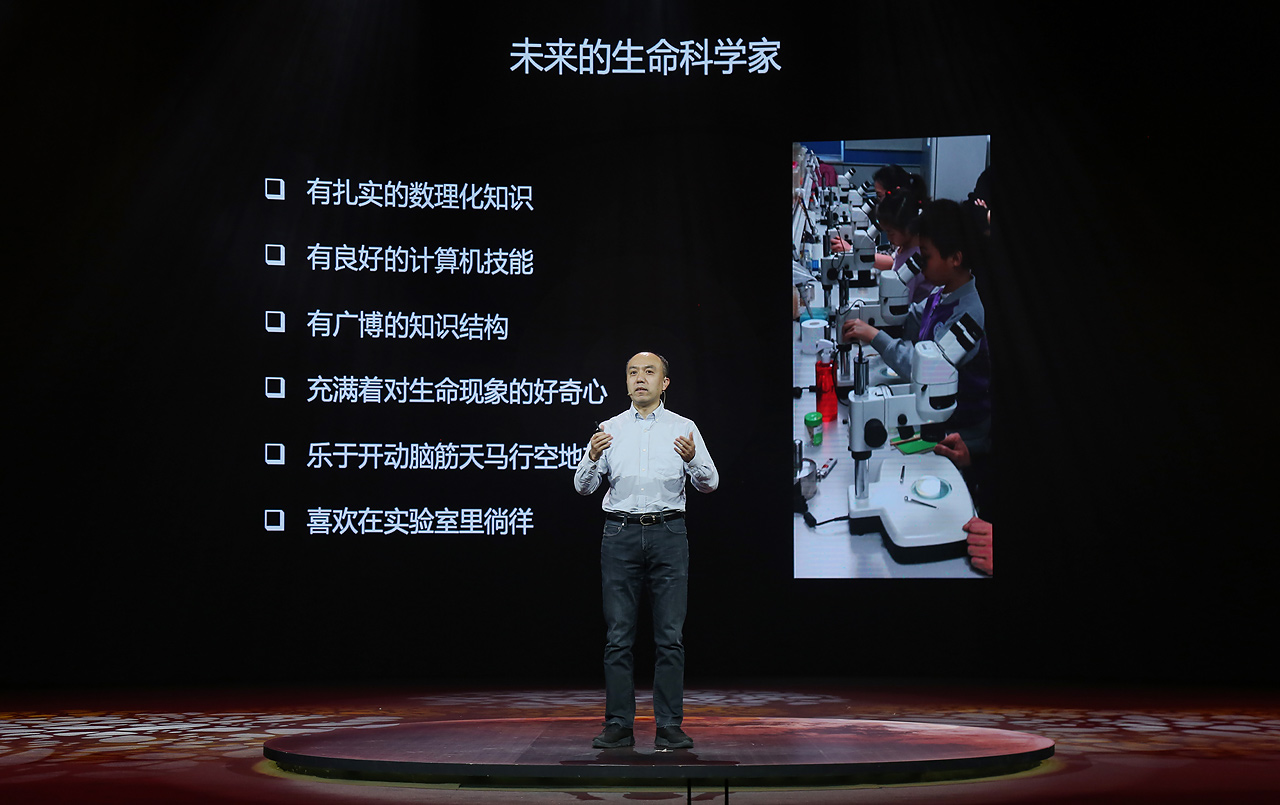
Hongwei Wang, leader of a world's largest Cryo-EM Research Center
As the leader in the building of the world’s largest center of cryoelectron microscopy, Hongwei Wang, Dean of School of Life Sciences at Tsinghua University, interpreted the mysteries in the microworld. He began with the development history of microscope technology over hundreds of years and illustrated the groundbreaking use of cryoelectron microscopy as well as the potentials of this technology to support biopharmaceutics. He encouraged the young people to familiarize themselves with the basic principles of mathematics, physics and chemistry, acquire computer skills, develop a broad academic foundation and a strong curiosity for life phenomena, think outside the box, and spend more time in laboratories in order to be successful in the field of life science.

Marc Abraham, founder of the world's most popular science award "Ig Nobel Prize", editor-in-chief of the Annals of Improbable Research (AIR)
Marc Abraham, originator of the Ig Nobel Prize, recalled classic prize-winning works over the last 29 years, encouraging children to think more about science amidst their laughter. He told the story of a prize winner who helped a frog fly using magnetic levitation technology and was finally granted a Nobel Prize a decade later. He said, “The Ig Nobel Prizes do not care whether an invention is good or bad, possible or impossible. It recognizes something that makes you feel humorous or interesting and thought-provoking even after a week.”
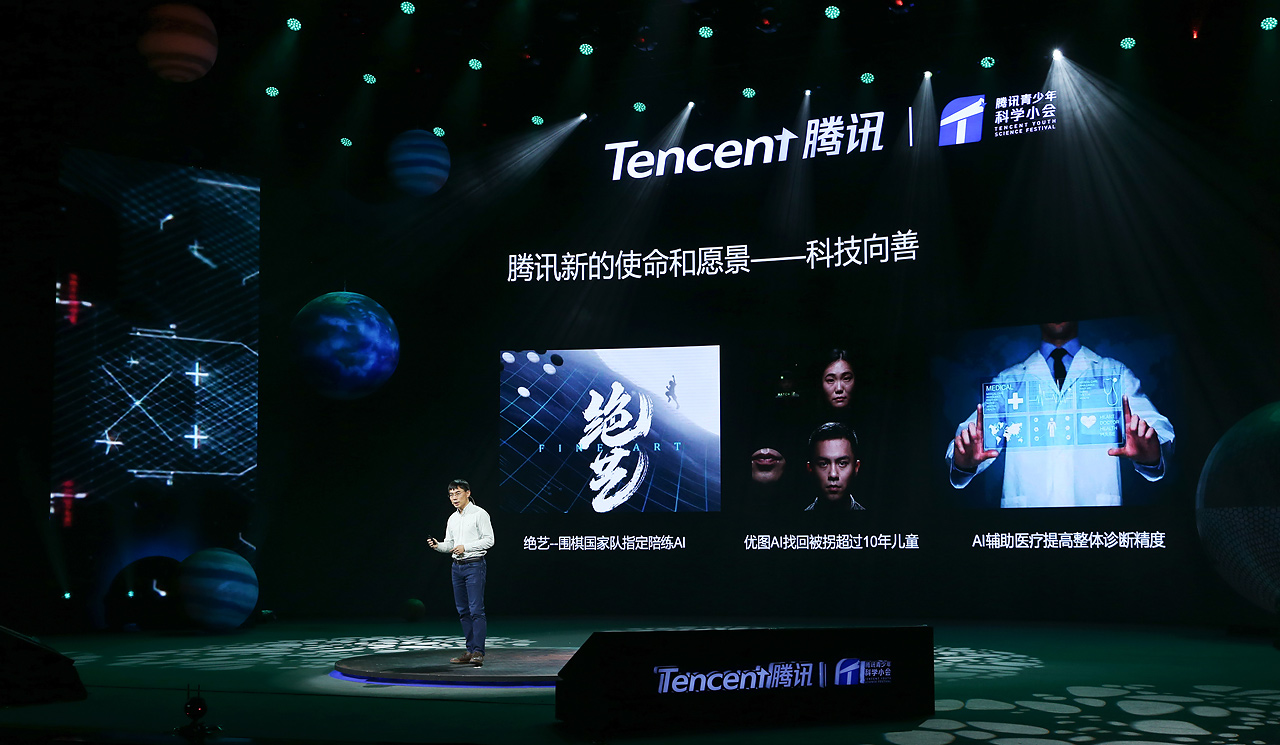
Shengyu Zhang, Distinguished Scientist from Tencent, Director of Tencent Quantum Lab.
Shengyu Zhang, head of Tencent Quantum Lab, explained the basic principles behind quantum algorithms and described the widespread use of quantum computing in fields like AI, physics and chemistry. “For a scientist, his mission is to pursue the truth, beauty, and a better understanding of everything in the world, and to bring a meaningful change to human life.” Guided by its mission and vision of “Tech for Good”, Tencent invests heavily in AI, quantum computing and other cutting-edge technologies, achieving successful application in several fields, including the Go-playing computer program AI-Fine Art, AI-assisted healthcare and the tracing of missing children.
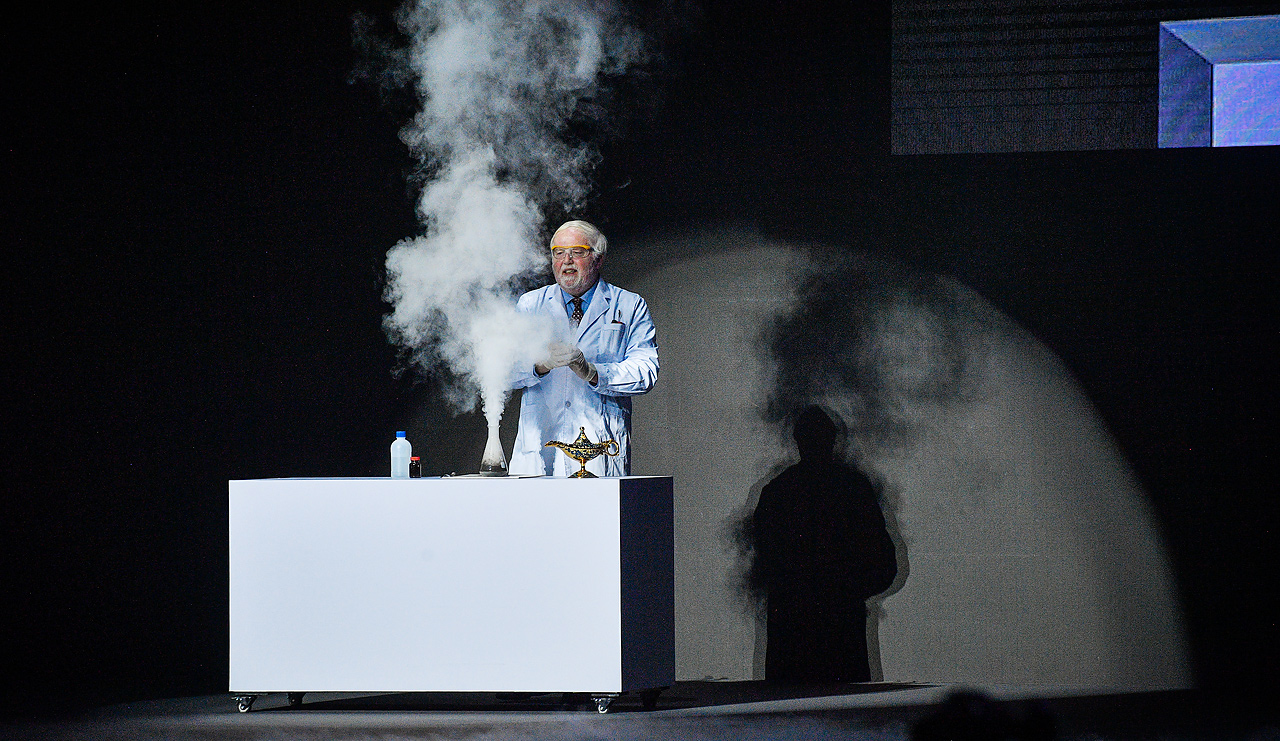
David G. Evans, Doctor of Oxford University who teaches chemistry in Chinese, the most adorable "chemical grandpa" among Chinese teenagers
As a Fellow of the Royal Society of Chemistry (FRSC), David G. Evans has lectured on chemistry in Chinese for 24 years. He began with an “ Aladdin Lamp” experiment, going on to describe the key role of chemistry in human life as well as the social development and diverse applications of hydrotalcite-like materials. He also shared his insights as a popular science scholar on the short video platform. His humorous performance sparked passion in children, inspiring them to explore the fun in chemistry.
1.2 million young people vote for the Science Breakthroughs and the Science Caravan brings science to the countryside
Tencent and Science have published the Science Breakthroughs for Youth for two consecutive years. This year saw a massive surge in young voters from 100,000 in 2018 to 1.2 million. Voting results showed that astronomical breakthroughs, including the black hole and lunar exploration, were the most popular topics among the Chinese youth.
As the world’s sole publication of science breakthroughs geared towards youth, this list is highly authoritative and influential. Young people select the top 20 breakthroughs in science by voting on Tencent Kandian. Editors from the world’s leading journal Science and the top scientists then finalize the 10 most significant scientific breakthroughs. Science’s News Editor Tim Appenzeller announced the results on stage.
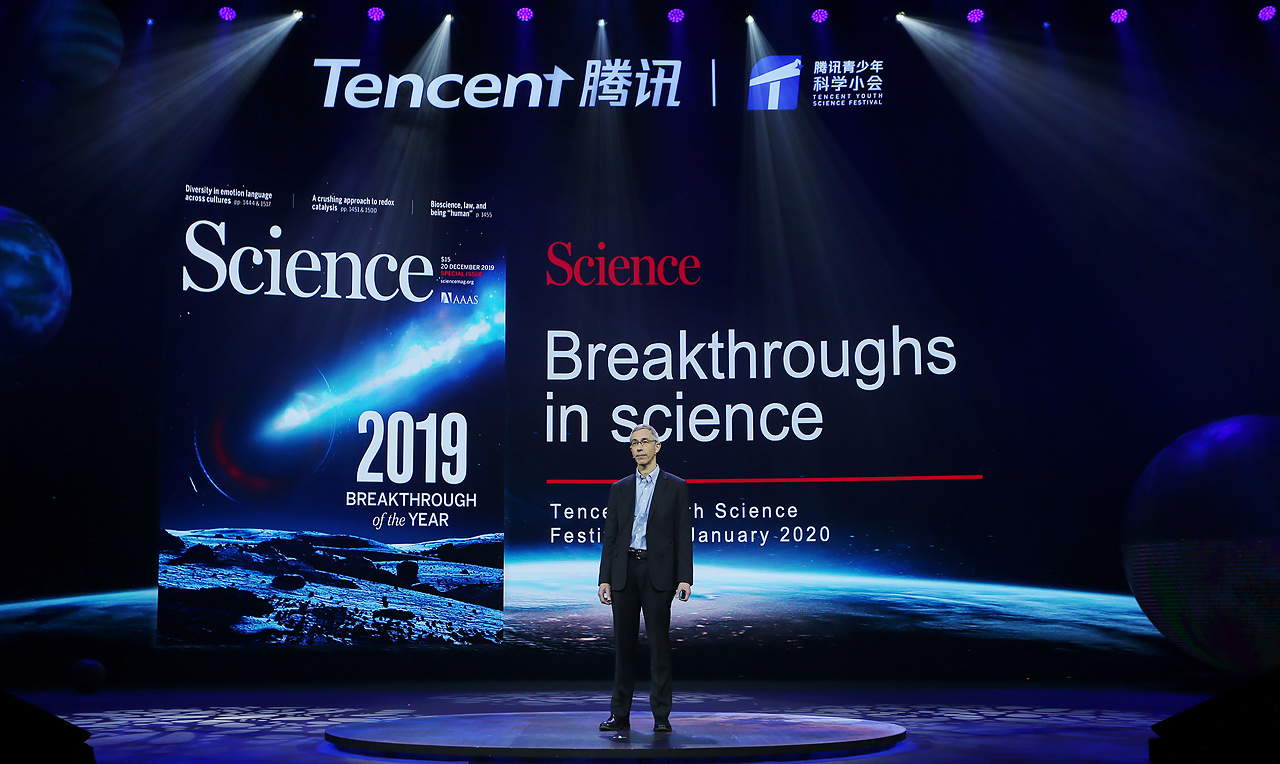
Head of the News Editor for Science Magazine
This year’s list includes the most exciting breakthroughs in astronomy, mathematical physics, life science and chemistry. Some topics are related to human exploration of the vast universe, among which are the release of the first black-hole picture and the successful landing of Chang'e-4 probe on the dark side of the moon. Some topics are of great medical importance, such as the use of bacteria to create a universal blood type and the use of nanorobots to shrink tumors. Some breakthroughs point to the past, including the discovery of the oldest human skulls. Some technological frontiers that concern the future, including the backward conversion of carbon dioxide to coal, and AI’s victory over humans in multiplayer poker, also secured their presence on the list.
The Tencent Youth Science Festival, together with QQ Music, published the Playlist of Scientists. Lucy Hawking, daughter of the renowned British physicist Stephen William Hawking, the “expert in rock ‘n’ roll” Professor Yonghai Chen, as well as other scientists and popular science scholars, recommended the songs together with “S Music Makers” on QQ Music’s open platform. Featured on the playlist are 51 songs that contain interesting scientific content, like Fly Me to the Moon, the Element Song, and Fantasia of Biology.
The Tencent Youth Science Festival has grown from a pilot scheme to a sustainable social service. This event has brought science to remote areas, inspiring rural children’s curiosity to explore the field of science.
In September 2019, the Tencent Youth Science Festival announced its partnership with China Science and Technology Museum to bring its videos and articles containing popular science content to Science Caravan. The pilot projects were launched in the remote mountainous areas, including Yanshan County of Wenshan Prefecture, Yunnan Province, Enyang District of Bazhong City, Sichuan Province, and the Sunan yugu Autonomous County of Zhangye City, Gansu Province. The Star Movie Theater was constructed to offer immersive viewing of popular short science films in 3D as well as a “mobile” science festival, like the Science Caravan Carnival, an interactive science tour show and presentations by scientists. The Science Caravan program is expected to stretch across 32 Chinese provinces, serving as many as 16 million young people each year from 2020.
Before the inaugural Tencent Youth Science Festival, Tencent Chairman and CEO Ma Huateng appealed for the support of education for youth and protection of children’s imagination and curiosity. “As long as we continue to encourage them, children will unlock secrets previously unknown to generations before them. This is the basis for scientific discovery and technological innovation.” He had once during the NPC and the CPPCC suggested that all non-governmental organizations and individuals should be encouraged to get involved in science education.
To promote discovery and cultivation of young talents, Tencent, along with Beijing Hefeng Art Foundation, launched the Art Campaign in November 2017 to explore the combination of internet and arts education and inspire interest in art for rural children. Tencent launched the Tencent Youth Scientist Program in September 2018, an important initiative that involves plans for several young talent development programs, including the Tencent Youth Science Festival. To date, Tencent has successfully hosted the Tencent Youth Camp for three years to promote exchanges among youths from mainland China, Hong Kong and Macau and to provide them with access to the most cutting-edge technologies and the latest cultural and creative developments. At the beginning of 2019, Tencent introduced the platform Tencent Youth Travel to connect over 100 well-known enterprises, schools and institutions across the Guangdong-Hong Kong-Macau Greater Bay Area, and to offer the free research and learning experience for youth. Within half a year, the platform served over 4,000 households, and over 1.2 million users participated in the event via mini program.
Related Articles

#TencentInnovates to Support Senior Citizens, Keep Birds from Crashing, Reduce Carbon, and Enhance Video Calls
2024.03.18

Tencent Blockchain Makes Over 6,500 Artworks from Dunhuang Caves Accessible to the Public for the First Time
2022.12.08



